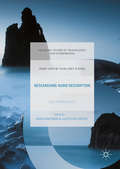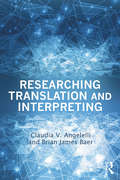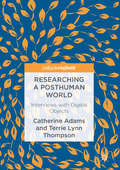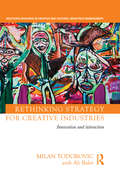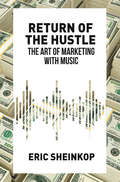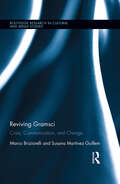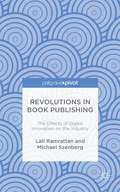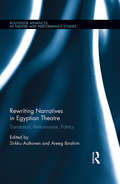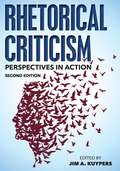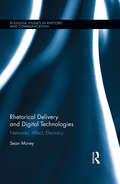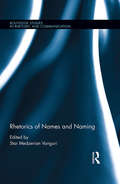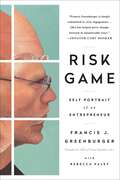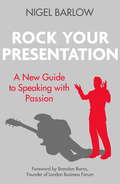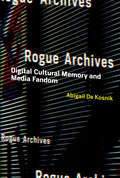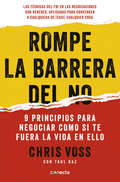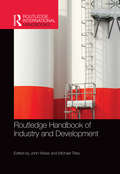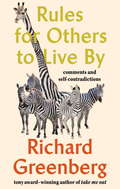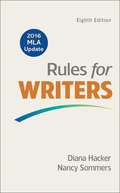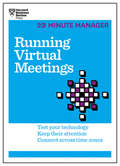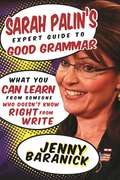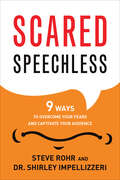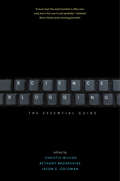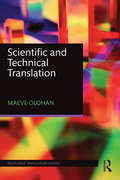- Table View
- List View
Researching Audio Description
by Anna Matamala Pilar OreroAudio description is one of the many services available to guarantee accessibility to audiovisual media. It describes and narrates images and sounds and resulting audio is then mixed with the original soundtrack. Audio description is a complex process that touches production, distribution and reception. Researching Audio Description: New Approachesgathers academic information and data from the many existing research projects, practices, and training across the world. The book has a telescopic approach, from two introductory chapters where accessibility in general is contextualised as a human right, and the basic concepts of disability and impairment are explored. Research on specific features for audio description script drafting are focused in the second part of the book, with a view to revising existing funded projects and their outcomes. The book offers a wealth of information on both the practical and philosophical, from different approaches in perception and cognition, and different research methodologies. Project information contained in the contributions identifies trends in current research-funded studies which will be valuable as a pointer towards future proposals. The book shows the dynamic state of audio description practice, training and research, while contributing towards the growing critical mass needed in building the field of accessibility studies.
Researching Translation and Interpreting: A Call For Dialogue Between Research And Practice (American Translators Association Scholarly Monograph Ser. #Xiv)
by Brian James Baer Claudia V. AngelelliThis volume offers a comprehensive view of current research directions in Translation and Interpreting Studies, outlining the theoretical concepts underpinning that research and presenting detailed discussions of the various methods used. Organized around three factors that are responsible for shaping the study of translation and interpreting today—post-positivist theoretical approaches, developments in the language industry, and technological innovations—this volume is divided into three parts: Part I introduces the basic concepts organizing translation and interpreting research, such as the difference between qualitative and quantitative research, between product-oriented and process-oriented studies, and between prescriptive and descriptive approaches. Part II provides a theoretical mapping of current translation and interpreting research, covering the theories underlying the current conceptualization of translation and interpreting, from queer studies to cognitive science. Part III explores the key methodological approaches to research in Translation and Interpreting Studies, including corpus-based, longitudinal, observational, and ethnographic studies, as well as survey and focus group-based studies. The international range of contributors are all leading research experts who use the methodologies in their work. They present the research aims of these methods, offer sample research questions that can—and cannot—be addressed by these methods, and discuss modes of data collection and analysis. This is an essential reference for all advanced undergraduates, postgraduates, and researchers in Translation and Interpreting Studies.
Researching a Posthuman World: Interviews with Digital Objects
by Catherine Adams Terrie Lynn ThompsonThis book provides a practical approach for applying posthumanist insights to qualitative research inquiry. Adams and Thompson invite readers to embrace their inner – and outer – cyborg as they consider how today’s professional practices and everyday ways of being are increasingly intertwined with digital technologies. Drawing on posthuman scholarship, the authors offer eight heuristics for “interviewing objects” in an effort to reveal the unique – and sometimes contradictory – contributions the digital is making to work, learning and living. The heuristics are drawn from Actor Network Theory, phenomenology, postphenomenology, critical media studies and related sociomaterial approaches. This text offers a theoretically informed yet practical approach for asking critical questions of digital and non-digital things in professional and personal spaces, and ultimately, for considering the ethical and political implications of a technology mediated world. A thought-provoking and innovative study, this book will be of great interest to scholars and researchers of technology studies, digital learning, and sociology.
Rethinking Strategy for Creative Industries: Innovation and Interaction (Routledge Research in Creative and Cultural Industries Management)
by Milan Todorovic with Ali BakirCreative Industry practices are increasingly manifested through hybrid models and methods and emerging sub-sectors. With ever finer dividing lines between form and content, product and service, participation and consumption, the distinctions between sectors are increasingly blurred, while new, convergent models emerge. Reflecting this fluid context, this book provides a new perspective on strategy in the Creative Industries. Based on extensive original research and live empirical data derived from case studies, interviews, and observations with creative managers, it reveals strategic decision-making by analysing business manoeuvres and stages of innovation in the Creative Industries. Through analysing the interactive features of aesthetically driven information assets, and how new user/consumer cultures are applied, it uncovers the principles that are transforming strategy in the Creative Industries. This innovative volume will be of significant interest to scholars, advanced students and practitioners in the Creative Industries as well as well as industry consultancies and practitioners.
Return of the Hustle: The Art of Marketing With Music
by Eric SheinkopHas a commercial ever brought you to tears? Has a movie ever inspired you so much you change your way of life? Has the series finale of a television show ever broken your heart? Has a video game ever altered your perception of reality? If you're like most consumers, you answered 'yes' to at least one of those questions. Whether you remember it or not, the music of that ad, film, show or game probably played a big role in influencing your emotional response during that experience. In fact, music is included in media specifically for the purpose of connecting with audiences on a deeper level that visuals alone cannot access. A strong music strategy is fundamental to the success of television, film, brands and video games. Because of higher expectations for audiovisual content, it will take more than clever animation or a celebrity cameo to connect with consumers in an authentic, organic way. By providing audiences with a genuine music experience, whether with an exclusive song through an artist partnership or by featuring new music from an emerging band, you can build a bond that extends far beyond product experience. Music touches us emotionally in a way that words seldom do. We feel it – we remember it.In Return of The Hustle, a leading music and marketing industry insider discusses the diverse audio touchpoints for four key industries and shows how marketers, storytellers, and advertisers can use music to effectively guide audiences along the customer journey from passive consumers to brand advocates. Return of The Hustle provides readers with a blueprint for music strategy that professionals at any level in any industry can use to attract consumers, immerse them into the content, and extend relationships between them and the brand long after the commercial ends or the credits roll. With detailed case studies, exhaustive interviews, and thorough research, Return of the Hustle gives readers the playbook to use the marketing power of music to drive business results.
Reviving Gramsci: Crisis, Communication, and Change (Routledge Research in Cultural and Media Studies)
by Marco Briziarelli Susana Martínez GuillemEngaging debates within cultural studies, media and communication studies, and critical theory, this book addresses whether Gramscian thought continues to be relevant for social and cultural analysis, in particular when examining times of crisis and social change. The book is motivated by two intertwined but distinct purposes: first, to show the privileged and fruitful link between a "Gramscian Theory of Communication" and a "Communicative Theory of Gramsci;" second, to explore the ways in which such a Gramscian perspective can help us interpret and explain different forms of political activism in the twenty-first century, such as "Occupy" in the US, "Indignados" in Spain, or "Movimento Cinque Stelle" in Italy.
Revolutions in Book Publishing: The Effects Of Digital Innovation On The Industry
by Michael Szenberg Lall RamrattanRevolutions in Book Publishing: The Effects of Digital Innovation on the Industry
by Michael Szenberg Lall RamrattanRevolutions in Book Publishing uses dynamic methods to examine the evolution of the industry's transition from physical place to cyber space, analyzing the latest effects of technological innovations on the industry as well as their influence on distribution channels, market structure, and conduct of the industry.
Rewriting Narratives in Egyptian Theatre: Translation, Performance, Politics (Routledge Advances in Theatre & Performance Studies)
by Sirkku Aaltonen Areeg IbrahimThis study of Egyptian theatre and its narrative construction explores the ways representations of Egypt are created of and within theatrical means, from the 19th century to the present day. Essays address the narratives that structure theatrical, textual, and performative representations and the ways the rewriting process has varied in different contexts and at different times. Drawing on concepts from Theatre and Performance Studies, Translation Studies, Cultural Studies, Postcolonial Studies, and Diaspora Studies, scholars and practitioners from Egypt and the West enter into dialogue with one another, expanding understanding of the different fields. The articles focus on the ways theatre texts and performances change (are rewritten) when crossing borders between different worlds. The concept of rewriting is seen to include translation, transformation, and reconstruction, and the different borders may be cultural and national, between languages and dramaturgies, or borders that are present in people’s everyday lives. Essays consider how rewritings and performances cross borders from one culture, nation, country, and language to another. They also study the process of rewriting, the resulting representations of foreign plays on stage, and representations of the Egyptian revolution on stage and in Tahrir Square. This assessment of the relationship between theatre practices, exchanges, and rewritings in Egyptian theatre brings vital coverage to an undervisited area and will be of interest to developments in theatre translation and beyond.
Rhetorical Criticism, Second Edition: Perspectives In Action (Communication, Media, and Politics)
by Jim A. KuypersThis text provides a thorough, accessible, and well-grounded introduction to the breadth of approaches and perspectives comprising contemporary rhetorical criticism.
Rhetorical Delivery and Digital Technologies: Networks, Affect, Electracy (Routledge Studies in Rhetoric and Communication #27)
by Sean MoreyThis book theorizes digital logics and applications for the rhetorical canon of delivery. Digital writing technologies invite a re-evaluation about what delivery can offer to rhetorical studies and writing practices. Sean Morey argues that what delivery provides is access to the unspeakable, unconscious elements of rhetoric, not primarily through emotion or feeling as is usually offered by previous studies, but affect, a domain of sensation implicit in the (overlooked) original Greek term for delivery, hypokrisis. Moreover, the primary means for delivering affect is both the logic and technology of a network, construed as modern, digital networks, but also networks of associations between humans and nonhuman objects. Casting delivery in this light offers new rhetorical trajectories that promote its incorporation into digital networked-bodies. Given its provocative and broad reframing of delivery, this book provides original, robust ways to understand rhetorical delivery not only through a lens of digital writing technologies, but all historical means of enacting delivery, offering implications that will ultimately affect how scholars of rhetoric will come to view not only the other canons of rhetoric, but rhetoric as a whole.
Rhetorics of Names and Naming (Routledge Studies in Rhetoric and Communication #29)
by Star Medzerian VanguriThis volume takes up rhetorical approaches to our primarily linguistic understanding of how names work, considering how theories of materiality in rhetoric enrich conceptions of the name as word or symbol and help explain the processes of name bestowal, accumulation, loss, and theft. Contributors theorize the formation, modification, and recontexualization of names as a result of technological and cultural change, and consider the ways in which naming influences identity and affects/grants power.
Risk Game: Self Portrait of an Entrepreneur
by Francis J. GreenburgerPrior to the real-estate boom of the 1980s, Francis J. Greenburger risked it all to buy three older loft buildings at 50 West Street near the current 9/11 Memorial. He ultimately dreamed of one day erecting a magnificent skyscraper in their place. But disaster struck in 2008, just as his plans were coming together, and development came to a screeching halt. The global financial crisis had made the land practically worthless and it would be years before he could get back on track, but he refused to give up on his dream. Today, 50 West is a striking 780-foot skyscraper with curved glass windows that has become an iconic feature on the city skyline—but it took much more than a financial investment to get there. It required Greenburger to do what he does best—take huge risks at every turn. During his parallel careers, Francis J. Greenburger has made publishing and real-estate history. Whether risking the reputation of his agency for the super -star authors of tomorrow, such as James Patterson to Dan Brown, or pioneering the New York co-op market by taking "hopeless" properties and turning them into prized homes, he has successfully navigated the worlds of business, politics, and social change to become the quintessential American entrepreneur. A math and business prodigy who started working for his father at the age of 12. After a stop–and-start academic career, he voluntarily left one of the most elite and academically distinguished New York City high schools and started his adult life at 15. Greenburger has made it his life's work to find value where others never thought to look, and his keen instincts and innovative strategies have taken him from a high-school "dropout" to a well-educated self-made billionaire. Francis has mastered the "risk game." Now, with Rebecca Paley's gripping prose, he takes us behind the scenes in Risk Game and reveals firsthand how he has become a self-made force in the competitive world of New York real estate—and a champion for nonprofit organizations in the fields of art, education, and, most recently, social and criminal justice.
Rock Your Presentation: A New Guide to Speaking with Passion
by Nigel BarlowThis book will protect your audiences from the following disorders:· Death by PowerPoint· Tedium· Compulsive fidgeting· Losing-the-Will-to-Live SyndromeNearly all of us have to pitch or present our ideas, whether in a formal setting like a theatre, at a company conference, in a classroom or even selling a concept one-to-one to our boss. In Rock your Presentation, Nigel Barlow, a professional keynote speaker and creative coach to many of the world's most famous organisations, gives you inspiring insights and practical techniques to 'rock up' your presentation or speech. Many of these tips come from exploring what makes great music so moving and impactful, and are easy to apply to make your own talks more dynamic and memorable. Try changing your key for different emotional impact; come up with a stronger chorus and an exciting climax; create your speaker's rider; be a protest singer to unleash your passion; and learn when and how to go unplugged to touch your audience. Whether you want to create a whole new presentation or tune up a tired old one, Rock Your Presentation will give you plenty of fresh ideas.
Rock Your Presentation: A New Guide to Speaking with Passion
by Nigel BarlowNearly all of us have to pitch or present our ideas, whether in a formal setting after lunch to a hundred jaded salespeople, in a lecture theatre or classroom, putting over our thoughts to a team of colleagues, or even selling a concept one-on-one to your boss.In all these situations we can choose between delivering a message that sounds like muzak, or one that wakes the listener up. Most presentations and pitches could benefit from being 'rocked up' - becoming more dynamic and memorable, in ways that arouse the passion of the audience. By applying the ideas in ROCK YOUR PRESENTATION you can deliver better, livelier and more emotionally engaging talks which leave audiences with the kind of high you get from being in a crowd at a great concert.Barlow applies the rock'n'roll metaphor throughout the book, turning what, to many, is a stressful subject into an exciting and fun exercise you can't wait to try out. So take the Van Halen approach to planning your presentation, deliver it like a hit song with a chorus and a bridge, play a few well-rehearsed power chords and set your audience ablaze.
Rogue Archives: Digital Cultural Memory and Media Fandom
by Abigail De KosnikAn examination of how nonprofessional archivists, especially media fans, practice cultural preservation on the Internet and how “digital cultural memory” differs radically from print-era archiving.The task of archiving was once entrusted only to museums, libraries, and other institutions that acted as repositories of culture in material form. But with the rise of digital networked media, a multitude of self-designated archivists—fans, pirates, hackers—have become practitioners of cultural preservation on the Internet. These nonprofessional archivists have democratized cultural memory, building freely accessible online archives of whatever content they consider suitable for digital preservation. In Rogue Archives, Abigail De Kosnik examines the practice of archiving in the transition from print to digital media, looking in particular at Internet fan fiction archives.De Kosnik explains that media users today regard all of mass culture as an archive, from which they can redeploy content for their own creations. Hence, “remix culture” and fan fiction are core genres of digital cultural production. De Kosnik explores, among other things, the anticanonical archiving styles of Internet preservationists; the volunteer labor of online archiving; how fan archives serve women and queer users as cultural resources; archivists' efforts to attract racially and sexually diverse content; and how digital archives adhere to the logics of performance more than the logics of print. She also considers the similarities and differences among free culture, free software, and fan communities, and uses digital humanities tools to quantify and visualize the size, user base, and rate of growth of several online fan archives.
Rompe la barrera del no: 9 principios para negociar como si te fuera la vida en ello
by Chris VossEl prestigioso ex negociador internacional del FBI Chris Voss, especializado en secuestros con rehenes, nos enseña un método de negociación rompedor: tácticas para negociaciones duras que son aplicables en múltiples aspectos de nuestras vidas. Rompe la barrera del no es un manual de negociación imprescindible desarrollado y perfeccionado a lo largo de la extraordinaria carrera de Chris Voss como negociador en secuestros con rehenes y como reconocido profesor en las escuelas de negocio más prestigiosas del mundo. Voss ha puesto a prueba estas técnicas en todo tipo de situaciones y ha comprobado su efectividad, tanto en los inicios de su carrera cuando patrullaba las peligrosas calles de Kansas City como en los cursos que imparte en las mejores universidades. Entre las muchas y distintas personas que han aplicado sus enseñanzas, se encuentran desde clientes que han visto aumentar significativamente los beneficios de sus empresas hasta estudiantes de programas de MBA que han conseguido empleos mejores o incluso padres que tienen que vérselas con sus hijos. Rompe la barrera del no relata los entresijos de situaciones verdaderamente dramáticas y revela las mejores y más eficaces estrategias de negociación. Voss, uno de los mejores negociadores del mundo, nos enseña a emplear estas técnicas en cualquier aspecto de nuestra vida. Reseñas:«Este libro destaca la importancia de la inteligencia emocional sin sacrificar la necesidad de conseguir acuerdos. Escrito por un negociador de rehenes, alguien que no se podía permitir una respuesta negativa, este libro resulta una lectura fascinante y muy práctica. En él encontraremos las técnicas necesarias para alcanzar el acuerdo deseado.»Daniel H. Pink, autor del bestseller Vender es humano «Pocas personas gozan de la experiencia de Chris Voss, ex negociador del FBI en situaciones de secuestros con rehenes. Sus técnicas funcionan, tanto para los negocios como para la vida.»Joe Navarro, agente especial (retirado) del FBI y autor del bestseller internacional El cuerpo habla «Los negocios, y prácticamente todo en la vida, dependen de cómo encaramos determinadas conversaciones cruciales, y estas herramientas nos proporcionan la ventaja que necesitamos... Es una lectura obligatoria para mis empleados, porque yo utilizo las lecciones de este libro cada día, y me gustaría que ellos también lo hicieran.»Jason MacCarthy, CEO de Goruck
Routledge Handbook of Industry and Development (Routledge International Handbooks)
by John Weiss Michael TribeThe Routledge Handbook of Industry and Development is a global overview of industrialisation. Each chapter will provide readers with contemporary insights into this this essential aspect of economic development. Industrialisation has been at the forefront of discussion on economic development since the earliest days of development economics. But over the last fifty years, the manufacturing sectors of different countries and regions have grown at strikingly different rates. In 1960 developing countries took a very small share of global manufacturing production. Today the position had changed radically with fast growth of manufacturing in many parts of what was originally the developing world, particularly in China and the rest of East Asia. On the other hand, countries in Africa and parts of Latin America have been largely left behind by this process of industrialisation. This volume aims to illuminate this uneven development and takes stock of the current issues that hinder and support industrialisation in low and middle income economies. This Handbook is a collection of chapters on different aspects of industrialisation experience in a range of countries. Key themes include, the role of manufacturing in growth, the nature of structural change at different stages of development, the role of manufacturing in employment creation, alternative options for trade and industrial policy, the key role of technology and technical change, and the impact of globalisation and the spread of global value chains and foreign direct investment on prospects for industrialisation. Several chapters discuss individual country experiences with examples from India, Mexico, South Africa and Tanzania, as well as an overview of African industrialisation. This authoritative Handbook will be a key reference source for those studying or wishing to understand contemporary economic development. Offering inspiration and direction for future research, this landmark volume will be of crucial importance to all development economics scholars and researchers.
Rules for Others to Live By: Comments and Self-Contradictions
by Richard GreenbergBetween stressing about his theater friends and reconciling his complicated feelings about an inconsistently wonderful New York City, Tony Award-winning playwright and Pulitzer finalist Richard Greenberg also maintains a reputation for being something of a hermit. He takes the time to privately process the absurdity of the world outside, and the result is this hysterically funny and daringly thoughtful collection of original essays. In Rules for Others to Live By, he shares lessons from his highly successful writing career, observations from two long decades of residence on a three-block stretch of Manhattan, and musings from a complicated and occasionally taxing social life. Firmly sympathetic to the struggles of the more bizarre and unstable among us, Greenberg tackles a range of topics--from the difficulties of friendship to the art of writing, the pain of heartbreak to the curiously unpredictable weather of his neighborhood, and the moderate hypochondria that comes with age, as well as the more serious health crises that unfortunately also come with age. In essays that are at turns quietly subversive and thoroughly hopeful and life-affirming, Greenberg's distinct and hilarious voice articulates our own mild obsessions and the idiosyncrasies that we can only hope will go unnoticed in a crowd.From the Hardcover edition.
Rules for Writers with 2016 MLA Update Eighth Edition
by Diana Hacker Nancy SommersTHIS TITLE HAS BEEN UPDATED TO REFLECT THE 2016 MLA UPDATES! Our editorial team has updated this text based on content from The MLA Handbook, 8th Edition. Nancy Sommers has woven a new emphasis on reading critically throughout the first section of the handbook, introduced advice for analyzing multimodal texts, and added help for public speaking. New practical Writing Guides support students working through college assignments in a variety of genres. And new peer review advice helps students effectively comment on drafts and apply feedback to revisions of their own work. and rubrics from their peers.
Running Virtual Meetings (HBR 20-Minute Manager Series)
by Harvard Business ReviewFrom crackly conference lines to pixelated video, virtual meetings can be problematic. But you can host a productive conversation in which everyone participates. Running Virtual Meetings takes you through the basics of: Selecting the right virtual venue Giving participants the information and support they need to connect and contribute Establishing and enforcing a common meeting etiquette Following up from afarDon't have much time? Get up to speed fast on the most essential business skills with HBR's 20-Minute Manager series. Whether you need a crash course or a brief refresher, each book in the series is a concise, practical primer that will help you brush up on a key management topic. Advice you can quickly read and apply, for ambitious professionals and aspiring executives-from the most trusted source in business. Also available as an ebook.
Sarah Palin's Expert Guide to Good Grammar: What You Can Learn from Someone Who Doesn't Know Right from Write
by Jenny BaranickA hilarious, informative guide to language and grammar inspired by America’s favorite maverick.It would seem to go without saying that a strong understanding of how to use language properly and effectively is a requisite for success in the 21st century. And yet, increasingly even some of America’s most prominent public figures and leaders seem to have only the most tenuous grasp of how to put together a coherent sentence or paragraph. No individual could be more representative of this unfortunate national tendency than Sarah Palin-the former Governor of Alaska, Fox News pundit, and now campaign surrogate for Donald Trump (another public figure with only a passing familiarity with how to use the English language).Time and again, Ms. Palin finds ways to bungle basic tenets of vocabulary, syntax, and grammar, often giving speeches or interviews that upon reexamination read more like the drunken ravings of someone unhinged. But it is for this very reason that Ms. Palin can be a great example for all Americans. Often it is only possible to learn from making mistakes, and Ms. Palin has made plenty. This book will be a guide that uses the colorful and chaotic language of Ms. Palin to illustrate key lessons of how (not) to write and speak well.
Scared Speechless: 9 Ways to Overcome Your Fears and Captivate Your Audience
by Shirley Impellizzeri Steve RohrPanic at the podium? This guide by a clinical psychologist and a Hollywood publicist will help you understand—and overcome—your public-speaking fears.What you say and how you say it speaks volumes about your professional promise and leadership potential. Whether it’s giving an impromptu sales pitch or keynoting a major business conference, public speaking can make you or break you. Are you scared yet? No surprise—most people are! In fact, it’s the #1 fear among Americans. Even many Academy Award winners still get the jitters, as talent rep and publicist Steve Rohr knows very well.Scared Speechless takes a powerful, unique approach that sets it apart from other public-speaking guides. Rohr’s coauthor, Dr. Shirley Impellizzeri, uses the psychology behind our fears to explain and tame our anxiety. Combine this knowledge with humorous anecdotes, real-world examples, and wisdom about the art of organizing and delivering a spectacular speech, and you have the freshest, most entertaining, and most effective public speaking book available.
Science Blogging
by Bethany Brookshire Christie Wilcox Jason G. GoldmanHere is the essential how-to guide for communicating scientific research and discoveries online, ideal for journalists, researchers, and public information officers looking to reach a wide lay audience. Drawing on the cumulative experience of twenty-seven of the greatest minds in scientific communication, this invaluable handbook targets the specific questions and concerns of the scientific community, offering help in a wide range of digital areas, including blogging, creating podcasts, tweeting, and more. With step-by-step guidance and one-stop expertise, this is the book every scientist, science writer, and practitioner needs to approach the Wild West of the Web with knowledge and confidence.
Scientific and Technical Translation (Routledge Translation Guides)
by Maeve OlohanRoutledge Translation Guides cover the key translation text types and genres and equip translators and students of translation with the skills needed to translate them. Concise, accessible and written by leading authorities, they include examples from existing translations, activities, further reading suggestions and a glossary of key terms. Scientific and Technical Translation focuses on texts that are typically translated in scientific and technical domains, such as technical instructions, data sheets and brochures, patents, scientific research articles and abstracts, popular science press releases and news reports. In seven chapters, this practical textbook: Introduces readers to the typical contexts in which scientific and technical translators work; Shows how corpus resources can be used for terminological and phraseological research; Considers how translation technologies are employed in technical and scientific translation; Explains a range of technical and scientific genres and their translation. Including a wide range of relevant tasks and activities, examples from the most commonly taught language pairs and a glossary of key terms, this is the essential textbook for modules on scientific and technical translation and specialised translation.
